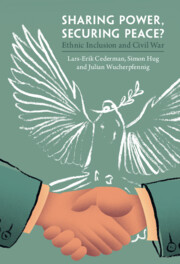Crossref Citations
This Book has been
cited by the following publications. This list is generated based on data provided by Crossref.
Hooghe, Liesbet
and
Marks, Gary
2023.
Differentiation in the European Union and beyond.
European Union Politics,
Vol. 24,
Issue. 1,
p.
225.
Demarest, Leila
and
Langer, Arnim
2023.
Managing Diversity in Nigeria’s Fourth Republic National Assembly: Integrated Parties versus Ethno-Regional Balancing.
Publius: The Journal of Federalism,
Vol. 53,
Issue. 4,
p.
593.
Corneo, Giacomo
2023.
The European Union and Achieving Peace in Ukraine.
Peace Economics, Peace Science and Public Policy,
Vol. 29,
Issue. 4,
p.
289.
Panzano, Guido
2024.
Do mutually reinforcing cleavages harm democracy? Inequalities between ethnic groups and autocratization.
Democratization,
Vol. 31,
Issue. 2,
p.
265.
Erdoğdu, Ulaş
2024.
Democratization, Foreign Military Intervention, and Rebel Fragmentation in Civil War: Evidence from the PKK Insurgency in Turkey.
Journal of Global Security Studies,
Vol. 9,
Issue. 4,
Cederman, Lars-Erik
Pengl, Yannick I.
Girardin, Luc
and
Müller-Crepon, Carl
2024.
The Future Is History: Restorative Nationalism and Conflict in Post-Napoleonic Europe.
International Organization,
Vol. 78,
Issue. 2,
p.
259.
Mueller, Sean
2024.
Shared Rule in Federal Theory and Practice.
Haughey, Sean
and
Loughran, Thomas
2024.
Public opinion and consociationalism in Northern Ireland: Towards the ‘end stage’ of the power-sharing lifecycle?.
The British Journal of Politics and International Relations,
Vol. 26,
Issue. 1,
p.
187.
Keil, Soeren
and
Aboultaif, Eduardo Wassim
2024.
Power-Sharing in the Global South.
p.
1.
Cederman, Lars‐Erik
2024.
Nationalism and the transformation of the state.
Nations and Nationalism,
Vol. 30,
Issue. 3,
p.
380.



